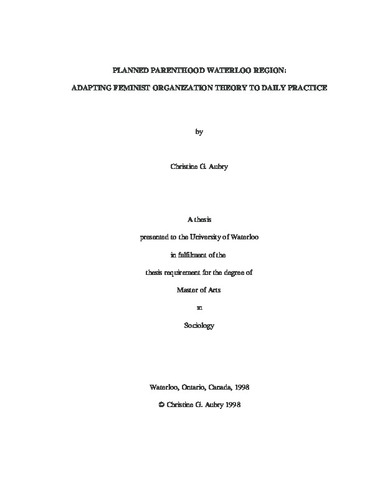UWSpace will be migrating to a new version of its software from July 29th to August 1st. UWSpace will be offline for all UW community members during this time.
Planned Parenthood Waterloo Region: Adapting Feminist Organization Theory to Daily Practice
| dc.contributor.author | Aubry, Christine G. | |
| dc.date.accessioned | 2022-07-11 13:46:02 (GMT) | |
| dc.date.available | 2022-07-11 13:46:02 (GMT) | |
| dc.date.issued | 1998 | |
| dc.date.submitted | 1998 | |
| dc.identifier.uri | http://hdl.handle.net/10012/18433 | |
| dc.description.abstract | As a volunteer with Planned Parenthood Waterloo Region (PPWR), I observed an organization that was providing services in a feminist context. PPWR is a feminist organization: a goal of the agency is to reduce gender power differences. Further, PPWR's participants work within an atmosphere of consensus and support. Because PPWR adheres to central feminist values and principles, some feminist organization theorists would argue that PPWR could, and should, follow the model of feminist consensual organizing. However, PPWR is also a service organization (like many bureaucratic organizations). The goals of the organization make structure and hierarchy necessary for goal achievement. In this thesis, I examine how PPWR reconciles the need for structure and hierarchy with feminist values and principles. The goal of this research is to examine what is unique about PPWR's organizational structure. This was an exploratory case study. My position as an insider with the organization allowed for qualitative data collection through participant observation and semi-structured interviews. Using organizational models found in traditional and feminist organization theory, I examine the organizational characteristics of PPWR. I explore the reasons why PPWR is hierarchically structured despite adherence to feminist principles. I also look at some of the dilemmas of consensual organizing practice which are particularly relevant to service organizations. Although PPWR is becoming increasingly structured, I argue that the organization is not likely to experience goal displacement. I examine internal and external characteristics of the organization which reinforce participants' commitment to organizational goals. The controversial nature of PPWR's services and the organization's social movement orientation counter-balance the problems which some feminists have attributed to the traditional bureaucracy. | en |
| dc.language.iso | en | en |
| dc.publisher | University of Waterloo | en |
| dc.subject | Planned Parenthood | en |
| dc.subject | bureaucracy | en |
| dc.subject | feminism | en |
| dc.title | Planned Parenthood Waterloo Region: Adapting Feminist Organization Theory to Daily Practice | en |
| dc.type | Master Thesis | en |
| dc.pending | false | |
| uws-etd.degree.department | Sociology and Legal Studies | en |
| uws-etd.degree.discipline | Sociology | en |
| uws-etd.degree.grantor | University of Waterloo | en |
| uws-etd.degree | Master of Arts | en |
| uws-etd.embargo.terms | 0 | en |
| uws.contributor.advisor | Burt, Sandra | |
| uws.contributor.affiliation1 | Faculty of Arts | en |
| uws.published.city | Waterloo | en |
| uws.published.country | Canada | en |
| uws.published.province | Ontario | en |
| uws.typeOfResource | Text | en |
| uws.peerReviewStatus | Unreviewed | en |
| uws.scholarLevel | Graduate | en |

